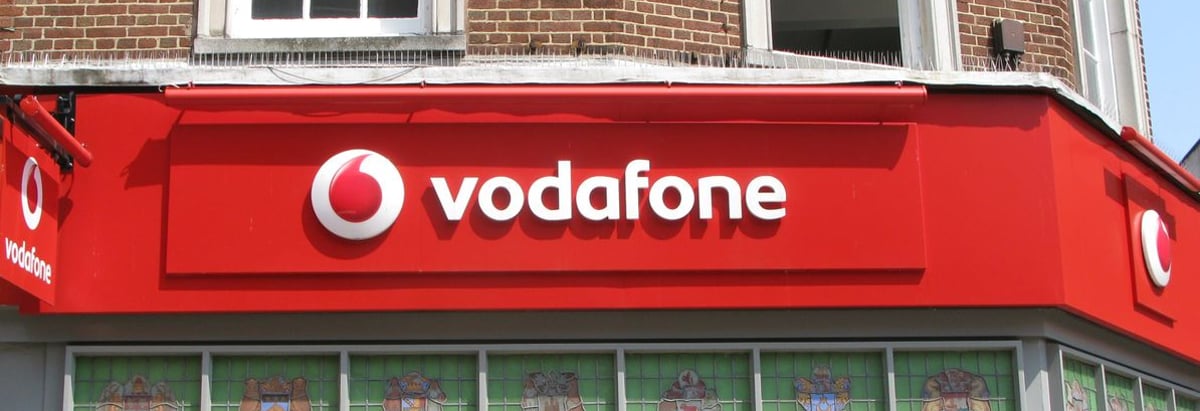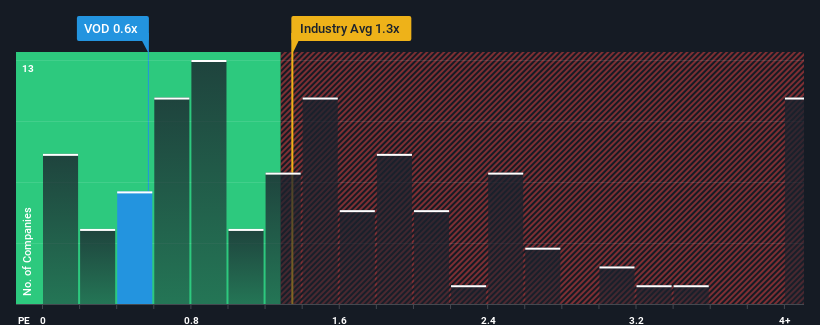- United Kingdom
- /
- Wireless Telecom
- /
- LSE:VOD
Little Excitement Around Vodafone Group Public Limited Company's (LON:VOD) Revenues

When you see that almost half of the companies in the Wireless Telecom industry in the United Kingdom have price-to-sales ratios (or "P/S") above 1.2x, Vodafone Group Public Limited Company (LON:VOD) looks to be giving off some buy signals with its 0.6x P/S ratio. Although, it's not wise to just take the P/S at face value as there may be an explanation why it's limited.
See our latest analysis for Vodafone Group

How Has Vodafone Group Performed Recently?
With revenue growth that's superior to most other companies of late, Vodafone Group has been doing relatively well. One possibility is that the P/S ratio is low because investors think this strong revenue performance might be less impressive moving forward. If not, then existing shareholders have reason to be quite optimistic about the future direction of the share price.
If you'd like to see what analysts are forecasting going forward, you should check out our free report on Vodafone Group.What Are Revenue Growth Metrics Telling Us About The Low P/S?
Vodafone Group's P/S ratio would be typical for a company that's only expected to deliver limited growth, and importantly, perform worse than the industry.
Taking a look back first, we see that the company managed to grow revenues by a handy 13% last year. Still, lamentably revenue has fallen 18% in aggregate from three years ago, which is disappointing. So unfortunately, we have to acknowledge that the company has not done a great job of growing revenue over that time.
Looking ahead now, revenue is anticipated to climb by 1.3% per annum during the coming three years according to the twelve analysts following the company. Meanwhile, the rest of the industry is forecast to expand by 3.4% per year, which is noticeably more attractive.
With this in consideration, its clear as to why Vodafone Group's P/S is falling short industry peers. It seems most investors are expecting to see limited future growth and are only willing to pay a reduced amount for the stock.
The Bottom Line On Vodafone Group's P/S
While the price-to-sales ratio shouldn't be the defining factor in whether you buy a stock or not, it's quite a capable barometer of revenue expectations.
As we suspected, our examination of Vodafone Group's analyst forecasts revealed that its inferior revenue outlook is contributing to its low P/S. Shareholders' pessimism on the revenue prospects for the company seems to be the main contributor to the depressed P/S. Unless these conditions improve, they will continue to form a barrier for the share price around these levels.
Before you settle on your opinion, we've discovered 3 warning signs for Vodafone Group that you should be aware of.
It's important to make sure you look for a great company, not just the first idea you come across. So if growing profitability aligns with your idea of a great company, take a peek at this free list of interesting companies with strong recent earnings growth (and a low P/E).
New: Manage All Your Stock Portfolios in One Place
We've created the ultimate portfolio companion for stock investors, and it's free.
• Connect an unlimited number of Portfolios and see your total in one currency
• Be alerted to new Warning Signs or Risks via email or mobile
• Track the Fair Value of your stocks
Have feedback on this article? Concerned about the content? Get in touch with us directly. Alternatively, email editorial-team (at) simplywallst.com.
This article by Simply Wall St is general in nature. We provide commentary based on historical data and analyst forecasts only using an unbiased methodology and our articles are not intended to be financial advice. It does not constitute a recommendation to buy or sell any stock, and does not take account of your objectives, or your financial situation. We aim to bring you long-term focused analysis driven by fundamental data. Note that our analysis may not factor in the latest price-sensitive company announcements or qualitative material. Simply Wall St has no position in any stocks mentioned.
About LSE:VOD
Vodafone Group
Provides telecommunication services in Germany, the United Kingdom, rest of Europe, Turkey, and Africa.
Adequate balance sheet average dividend payer.
Similar Companies
Market Insights
Community Narratives




